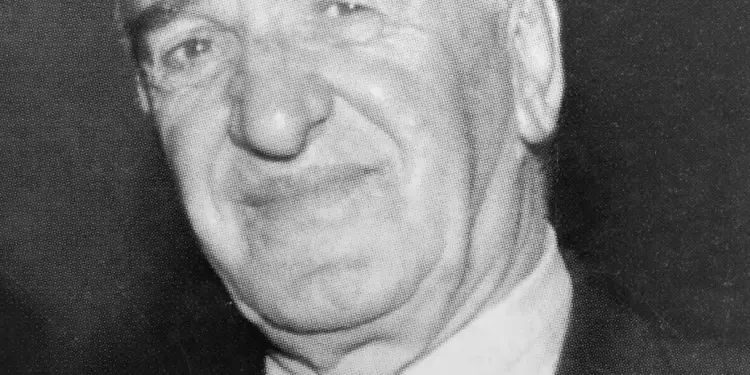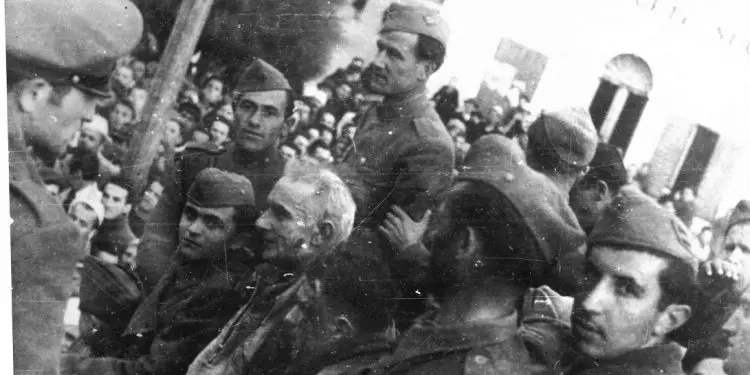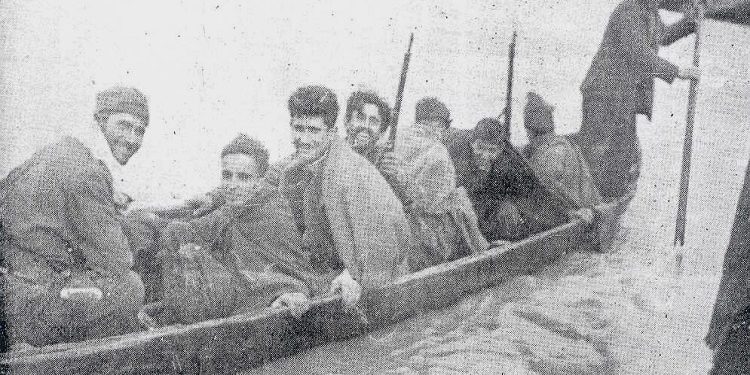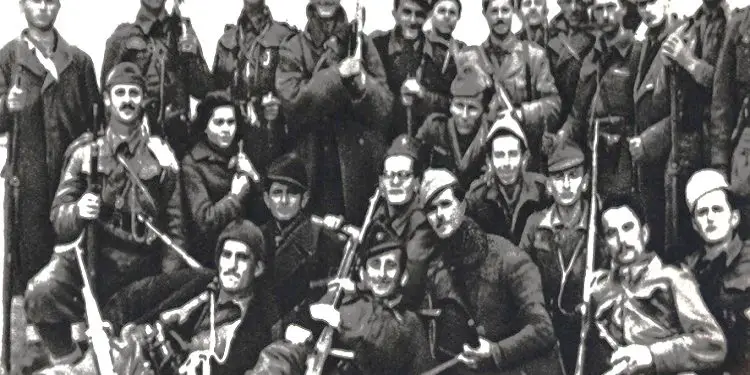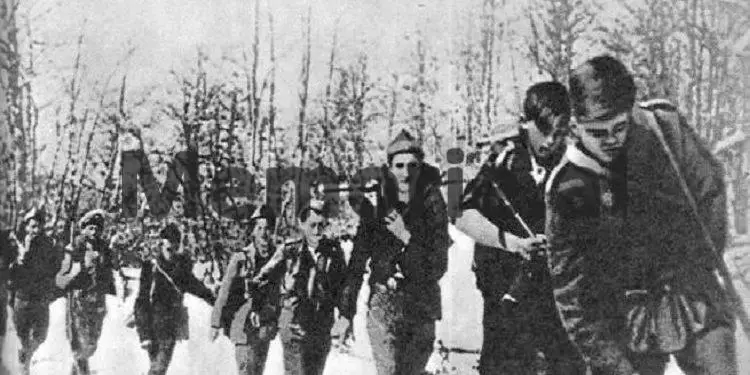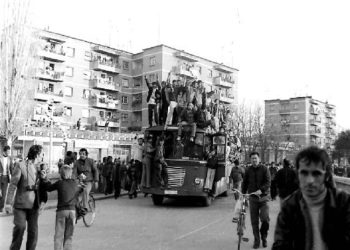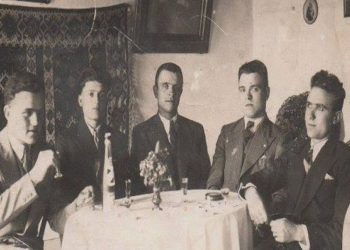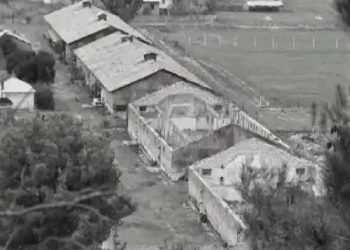By Ahmet Bushati
Part Five
Memorie.al/After the flag was altered in 1944 with the addition of the communist star, Shkodra transformed into a center of resistance against the regime, paying a high price for its tradition of freedom. By April 1945, high school students, already feeling betrayed by the promises of the war, gathered to oppose the new terror that imprisoned and killed innocent people. Communism turned Kosovo into a province of Yugoslavia, while Shkodra was punished for its “historical crime”- its defiance against invaders. The “Postriba Movement” became a tool to suppress all dissent, plunging the city into an unprecedented spiral of suffering: imprisonments, executions, and the destruction of families. The high school students, alongside citizens, became symbols of resistance, while some “young communists” turned into tools of the State Security, leading to expulsions, imprisonments, and internments.
Four times, Shkodra rose in armed rebellion, but history forgot these battles. This book is written to remember the countless prisoners, the tortured, the killed, and the parents who suffered in silence. It is a warning against dictatorship and a plea for future generations not to forget the sacrifices made for freedom.
Continued from the previous issue
In the Footsteps of a Diary
But communism itself, had it not had anything to do with Shkodra until then?
Nothing and never had connected Shkodra with communism, nor brought it even a little closer. We were children in primary schools – Zog’s time – when we had heard from our elders that somewhere far, far away, there was a country called Russia, and that for its own sake there was a man named Stalin, who, as an equal, as it was said, with everyone else, even worked his own land with a plow. But we, even though we were so young, would be truly shocked when we later heard that those people there did not consider their country their homeland like we did Albania, which we had just been taught in school, that there was also no religion or family, and that a brother could take his sister as his wife. Such, in terms of form and content, must have been the black message of communism, not only for us children, but also for the undeveloped masses of the time, and excluding a negligible number of idealistic and naive students, it would have been much blacker for the real intellectuals of that time.
It must have been that time when in Shkodra the illusory ideas of communism had just begun to spread, which although brought by the Shkodra intellectual Zef Mala, as well as by such a respected professor as Skënder Luarasi, and although the first followers had serious students like Qemal Stafa, Emin Duraku and others like them, as well as a dormitory of “Our Mountains”, as the most sensitive contingent to inhale those new and revolutionary ideas, like his own age and fiery spirit, along with the air.
Shkodra, for its part, would not give communism any intellectual prestige or mass base at that time. Consequently, during the period of the occupation of the country, the freedom-loving and generally anti-fascist people of Shkodra, even though they had accepted the war in their own way and had followed its actions with sympathy, due to the reservations they had towards it, would continue to stand as if in a bridge between the incitement to war and the fear of communism, so much so that the National Liberation Party, at the height of its success, July 1943, Shkodra and its districts would not give the party more than a force of only 96 partisans, perhaps less than any village in southern Albania should have produced at that time, which, to the worst fate of the country, they, without having thought properly, would merge liberation with communism, bringing back to Albania that blood that we would later suffer together.
Almost fifty years under communism, Shkodra, in one way or another, would oppose it, having repeatedly repeated those moral characteristics of its own, with which it, like a single thread, would overcome situations of great storms and dangers. The partisans of Shkodra parade in triumph.
When the departure of the Germans from Shkodra was a certainty for all the citizens, the partisans gathered partly the night before and partly that morning, in an area near the city, set off towards Shkodra. They came to the former Post-Telegraph building singing partisan songs, where they stopped to prepare for their triumphal parade in front of their people. Taking advantage of the partisans’ brief stop, teacher Rrok Zojzi climbed the external stairs of the building in question and, from their small podium, congratulated those partisans in a few simple words as “liberators” of the country.
The parade headed towards the Municipality and Prefecture. The partisan formations were led by a partisan with a flag raised high, followed by a small choir of partisans who walked singing. Behind them came the command trio with majors Sadik Bektesh in the middle and Rexhep Haka and Qazim Kapisyzi on his side. At the head of several partisan groups, we would see other wartime figures, such as our former professor, Mark Ndoja, and then Gjovalin Luka, Muntaz Shehu, Frano Jakovë, Çiril Pistoli, etc.
The people, who had already lined up on both sides of the road waiting for them, driven more by curiosity to see “those from the mountains” – as the partisans were sometimes called during the war – cheered them on with a restrained sense of sympathy and not with the enthusiasm that the liberators of a country usually deserve, because “Mukja”, “fratricidal”, “abandoning Kosovo”, “connection with the Yugoslavs” and the names Dushan and Miladin, so much talked about a year ago, had considerably diminished the image of the War and the belief in it, and this, not only among a large part of the people, but also among many of its activists and sympathizers, up until a year ago! So that day of victory and liberation, after more than five years of captivity, had none of the expected grandeur.
Starting from that day, our flag, which for centuries had symbolized our history and identity, would be desecrated with a “star” stuck on it, much worse than the Italian “Lictor’s axe” of a few years earlier, a flag that for forty years in a row would never symbolize the freedom, sovereignty and pride of a people, but that of its violence and humiliation.
For a little analogy, about a century earlier, precisely in 1848, when the workers of Paris, revolted by the deep misery they had been plunged into, raised the red flag in the city’s main square, the writer and poet Lamartine, who at that time was also a member of the “provisional government”, would address the angry crowds with these words: “It would be better to raise the black flag, with which to show that France is finished, than this red one, which symbolizes chaos and suicide.”
Also noteworthy are the numerous proclamations of those days, which, starting the day after that day of liberation, would be displayed in prominent places in the city, around which citizens would gather to read them, both out of curiosity and out of the need to familiarize themselves with the demands of a new reality. The first proclamation would be the one signed by Colonel Gjin Marku, which invited citizens to maintain order and calm and not to fire weapons.
Brigade after brigade of partisans, arriving daily in Shkodra!
Brigade after brigade of partisans, tired and exhausted from their long journeys, but proud and enthusiastic about the war and its cause, were arriving daily in Shkodra. Most of them, after a short break in our city, would continue their journey to Yugoslavia, to help their so-called “brothers” of an ideal, while another part would stay here in Shkodra and the surrounding area, deep into Malci and Dukagjin, to terrorize and kill their true brothers, but who, according to them, were already reactionaries.
The war had left behind many obstacles and difficulties for both the partisans and the population. The bridges connecting Shkodra with the villages had collapsed, and crossing the rivers was done by raft. The winter on the other side was very harsh and snow was falling from time to time. The “Neighborhood Councils” were only concerned with one task in those days: the dispersal of partisans among citizens’ homes, those partisans who brought with them the terrible “red lice”, and consequently, their deadly disease, called “red lice typhus”, lice and disease, which were being heard in Shkodra for the first time.
The women of those houses, in which partisans had stayed the night before, would, early the next morning, take care of thoroughly washing the sheets on which those partisans had slept, and to their greatest surprise, it would often happen that even after they had put those sheets in “fì” – a pot of boiling water – and “beat” them with a “pirajkë” – a small wooden tool – on top of stone slabs erected near the troughs, also made of stone, not all the lice would have died. And when the women of the house would place those snow-white sheets on the “wires” in the yard, they would watch in fear and wonder as if there would once again be live lice, which, after having successfully overcome all forms of extermination, would, ironically, continue to move about lively and appear even redder than before.
Regardless of the cold, the snow that fell incessantly, the red lice, or even black ones if they were there, the scarce food, the so-so sleeping conditions, etc., etc., the difficulties of the time, those partisans who generally came from the South, did not want to know about anything and moreover, as soon as two or more of them got together, they would immediately start singing partisan songs, especially one that they kept as the song of the day, which began with the “heartwarming” verse for the people of Shkodra: “Lule Sofo, lule djala”, a song that over the years would be imitated with irony not only by the citizens of Shkodra, but also by the young people of our villages and mountains.
After the song “Sofo”, as one of the most listened to, it would also be the one that began with the verse: “We are the sons of Stalin, who shed blood everywhere, as long as the flag of the hammer and sickle lives above the earth”! Since the War and especially after Mukje, communist ideas had conquered a good part of our South to the point of madness, so much so that their adherents had convinced themselves that, as if destined by fate, they were precisely the ones who would violently change the face of a world filled with injustice.
The communist indoctrination and, consequently, their blind faith in brotherhood with the Yugoslavs, were so deeply embedded in their consciences that, contrary to the noblest Albanian traditions, they, as if they had instilled much evil in their souls, would mercilessly and painfully kill many a brother there among them, and when they returned to Shkodra, they would not have the slightest idea of improvising scenes of the Slavic type, of the most macabre.
Perhaps the partisans, as women that they were, attracted the attention of the citizens more strongly. Generally, they came from the villages of the south and, as such, they were often understood during their parades through the streets of the center of Shkodra, these cases when they would leave the impression that due to emotion, they were unable to properly control their arduous walk, walking as if on foreign feet. But from the emotion, even their gazes would be frozen and distracted, and when you noticed the military clothes in which they were wrapped, often torn and wrinkled, they would instantly arouse a feeling of pity, because it would seem as if the essence of their girlhood had been brutally denied by those who had speculated about them.
But the days would pass, and we would understand too late that those young girls, mostly from “brave” Labëria, were not at all timid or gentle, that they, like most of the male partisans, as uneducated as they were in general, but supposedly with great intelligence, had no need for any of our weaknesses, because for the much hatred they had instilled in their souls for their opponents, they would sometimes prove to be even more aggressive and unrestrained than their male comrades!
Maç Luca, one of the young men locked in the cave with Prek Cali, would tell us years later in prison how a partisan from the Greek villages of Gjinokastra named Kristinë, after having Maç tied up and turned him upside down, had crushed his ribs with her kicks and, as if to vent even more of the hatred that had been boiling inside her, had not stopped calling Maç, sometimes “pig” and sometimes “vile reactionary”!
Like the beating that Maçi had received from a woman, we would tease him several times, saying: “Maç, show us one more time how to beat Kristina”, and Maçi, already for humor, but taking the pose of a man who was supposedly suffering as he painfully remembered an event that had also been humiliating for him, as a man and a peasant that he was, as if to kiss deeply once, would always begin with the words: “Ah, if only you knew what Kristina did to me”?! And when he would end the story, shaking his head seriously several times, and still without taking his gaze from below, he would kiss again as if from the depths of his soul, crying: “Oh Kristina, Kristina”! And we would laugh and laugh, as Maçi himself should be ashamed.
The Shkodra communists were changing as if on command!
Excluding the partisans who continued to manifest pride and enthusiasm for the war and the victory they had achieved, a good part of the people, as if their curiosity about them had quickly faded, would fall into a state that oscillated somewhere between suspicion and “suspended” sympathy, because according to him, since those first days, clouds had begun to appear on the Albanian horizon, threatening a storm!
The Shkodra communists during the war had shown themselves to be quite active and determined, and although their party, especially after Mukje, sought to inject a lot of poison into their souls in relation to their political opponents, considered enemies from that time on, it must be said that they, thanks to the strong tradition of their city, restrained themselves somewhat and in some ways, were not completely detached from the ties and obligations of their fellow citizens, having limited themselves to the arrogant use of their well-known axiom “whoever is not with us is a fascist” and an irony, even with the names, of some of their most prominent opponents.
“However, from the first days after liberation, you would notice an immediate change in their attitude, when they would bow their heads before any authority coming from the south, with the excuse that; “they were the ones who had fought the war in the first place”. They would not have the courage or even bother if their government did not trust them or treat them as equals, and they would not be hurt in the slightest in their sense of noble dignity and civic pride, even when they saw themselves as secondary in their country.
They would also maintain a humble and servile attitude before the Yugoslavs, when the latter would freely and gratefully take over the healthy economy of their city. Thus, the Shkodra communists, passing from one day to the next, were losing more and more good personal qualities that they might have had, were severing without pain and without hesitation their ties with the people, in whose bosom they had grown, with the war also, which had just ended and with the spirit that it had, thus turning more and more into an amorphous dough in the hands of the tyrant Enver Hoxha, their leader.
Most of them, perhaps because they left much to be desired in terms of their personal formation, were experiencing the delirium of victory to the point of exaltation, without denying the cases that among them there was also someone who silently suffered the incompatibility of his ideals of war with a contrary reality that it had generated. The truth for all these communists, was that they, out of conviction or even out of fear and interests, were subjected once and for all, that in the span of a short time, they had abandoned every dream of The nobility had once inspired them, so much so that they would not even feel regret if, at the end of three or four years, they found themselves without any of their former respected leaders, in whose names they had boasted and had idealized in their war days.
It is precisely that time that not only marks their decline into indifference to the country’s drama, but that, according to the principle “to each his own” and denying any moral concept they had previously had, they would become once and for all conformists, blind and servile tools of a regime that would forcibly deny their people every freedom, right and aspiration. Memorie.al




